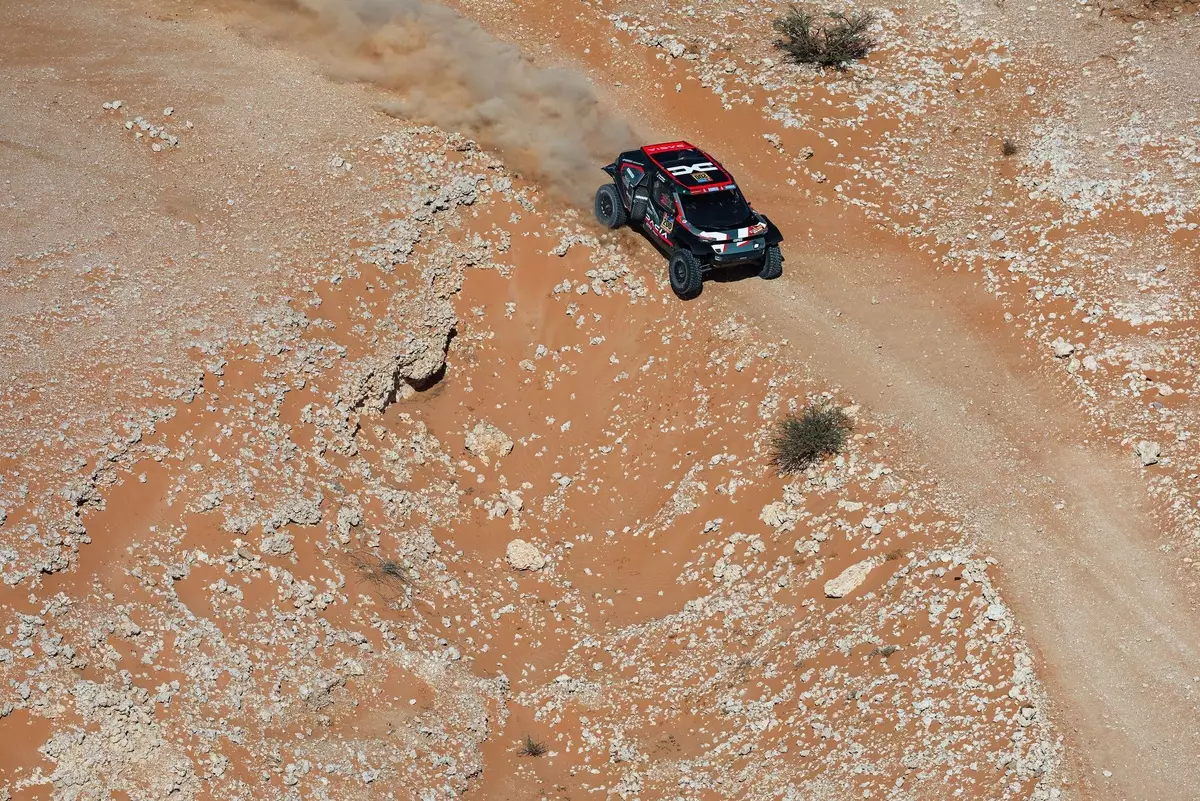Nasser Al-Attiyah, a seasoned veteran of the Dakar Rally, found his ambitions for a sixth title derailed during the tense action of Stage 10. This year’s rally, set against the stark and challenging backdrop of the Empty Quarters in Saudi Arabia, posed a formidable challenge not just physically but mentally for participants. Al-Attiyah’s conflict with navigation errors brought both frustration and a sense of urgency to the event, highlighting the razor-thin margins that can dictate success in such adrenaline-fueled contests.
A Mistake in Navigation: The Crucible of Competition
Opening the road is no small feat in the Dakar Rally, yet the immense pressure of leading can also lead to insurmountable challenges. On this particular stage, just nine kilometers in, a co-driver’s navigational oversight caused Al-Attiyah’s team to veer off course—a critical misjudgment that cost them approximately 13 minutes. In rally racing, where every second counts, such errors can severely compromise a driver’s standings. The emotional toll of this mishap was palpable, with Al-Attiyah expressing visible dismay over losing his way in the desert dunes.
The heart of this incident lies not just in the mistake itself but in the environment in which these events transpire. Navigation in the desert, with its shifting sands and unmarked contours, demands an acute awareness and experience that, regrettably, faltered on this day. Al-Attiyah’s reflection on the situation reveals an artful combination of his personal disappointment and a call for introspection to understand the root of the error.
The Weight of Expectations: Handling Pressure
As competitors turn their focus to the final stages of the rally, Al-Attiyah’s mental state is indicative of the pressure that comes with high-stakes competition. With the immense weight of expectations—for himself, his team, and his supporters—the disappointment of Stage 10 feeds into a broader narrative of resilience and perseverance. Al-Attiyah candidly shared his feelings of dismay, emphasizing how this failure was a stark departure from his history of success in the Dakar, where being lost was an anomaly for him.
Moreover, it highlights a critical aspect of rally racing: the psychological component. The mental resilience needed to pivot from disappointment toward upcoming challenges is essential for achieving victory, especially after such a setback. In reflective moments post-stage, Al-Attiyah’s thoughts reveal a man grappling with stress, tasked with recalibrating his strategy in the face of adversity, thus representing the age-old battle of mind over matter.
Co-driver Edouard Boulanger’s admission of his navigational error invites a discussion on team dynamics in racing. His ownership of the mistake serves as a reminder that this competitive sport relies on more than just the primary driver’s skill; it requires a tight-knit partnership built on trust, communication, and mutual accountability. Boulanger’s explanation—that he jumped a line in the roadbook—offers nuances often overlooked in high-pressure situations, showcasing how simple oversights can lead to dramatic consequences.
This scenario underlines the importance of continuous dialogue among team members, especially in a sport where the environment is unyielding and ever-changing. Boulanger’s focus on navigating by the cap after realizing his error illustrates a common strategy in crisis management. However, it also calls for an analysis of how teams discuss their strategies and learn from mishaps to avoid recurrence in future stages.
As the Dakar 2025 progresses, Al-Attiyah’s standing reflects the grave reality of his situation—currently sitting fourth with a considerable time gap to the leader. However, inherent in the spirit of rally racing is the mantra that nothing is insurmountable. With two stages remaining, every contender still has the chance for redemption. Al-Attiyah’s determination to reassess and recalibrate his approach could serve as both a lesson and inspiration to others in pursuit of glory.
Nasser Al-Attiyah’s journey through Stage 10 of the Dakar Rally embodies the volatile nature of motorsport, where a momentary lapse can shift the entire trajectory of a race. His grappling with disappointment, accountability from his co-driver, and the mental fortitude necessary for future performances succinctly illustrate the complexities at play. The rally isn’t merely a test of speed but a profound examination of strategy, collaboration, and the human spirit in the face of adversity. The remaining stages will undoubtedly demonstrate whether Al-Attiyah can reclaim his momentum and competitive edge or if this chapter marks a shift in his rallying narrative.

